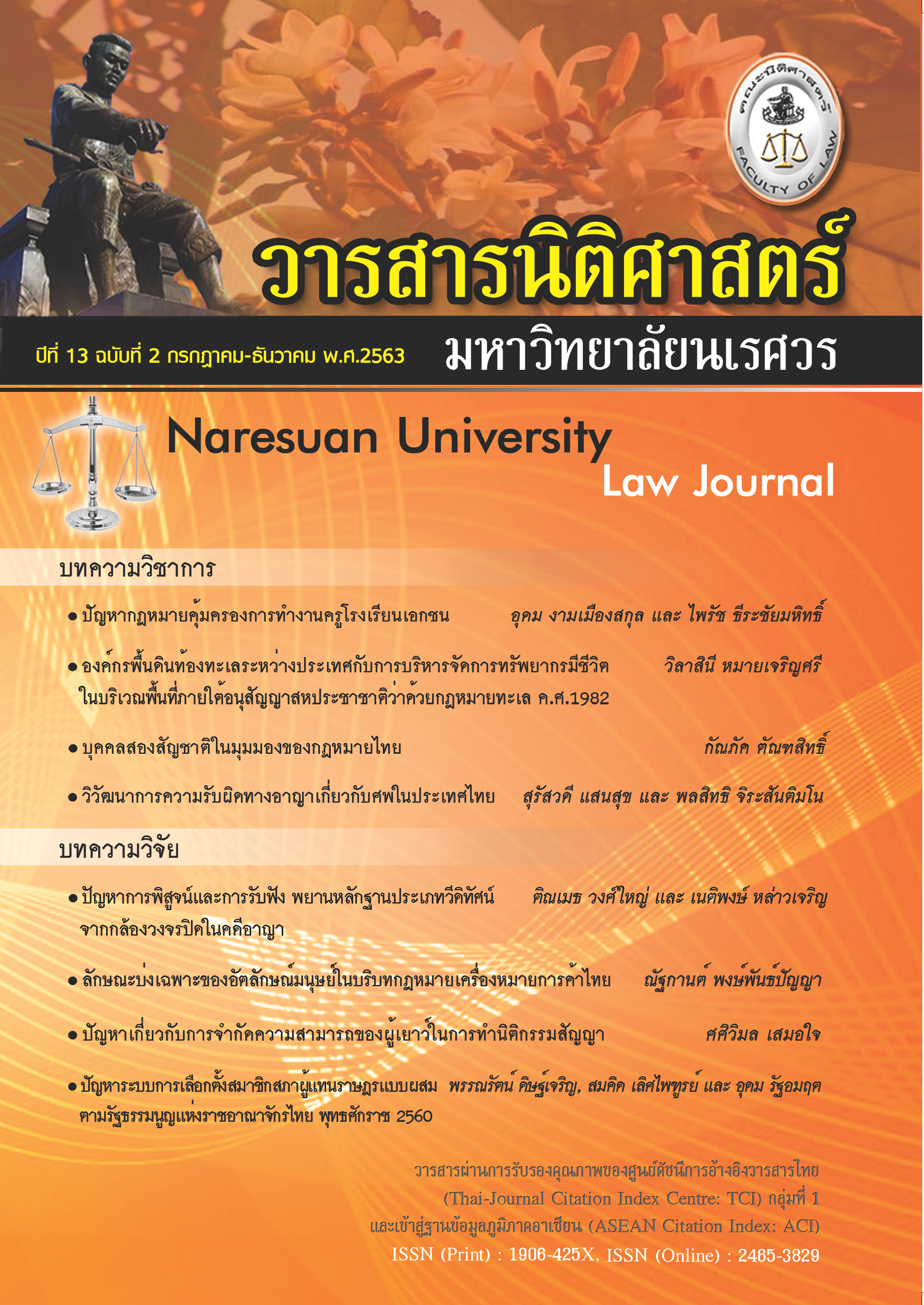The ปัญหาเกี่ยวกับการจำกัดความสามารถของผู้เยาว์ในการทำนิติกรรมสัญญา
Main Article Content
บทคัดย่อ
บทความนี้ มีวัตถุประสงค์เพื่อศึกษาว่า สภาพปัญหาทางกฎหมายของการจำกัดความสามารถของผู้เยาว์ที่อาจส่งผลกระทบต่อการทำนิติกรรมสัญญา โดยศึกษาทั้งจากเจตนารมณ์ของหลักสิทธิและเสรีภาพและทฤษฎีการจำกัดความสามารถในการทำสัญญาของผู้เยาว์ ว่ามีความสอดคล้องกันหรือไม่ และวิเคราะห์ถึงประเด็นปัญหาที่เกิดขึ้นจากความเปลี่ยนแปลงของสภาพสังคมและเศรษฐกิจที่อาจส่งผลต่อความสามารถของผู้เยาว์ เพื่อจะสามารถเข้าใจและปรับใช้หลักกฎหมายให้เข้ากับความก้าวหน้าของเทคโนโลยีในอนาคต
ผลการศึกษา พบว่า การจำกัดความสามารถของผู้เยาว์ในการทำนิติกรรมนั้น มีเพื่อคุ้มครองผลประโยชน์ของผู้เยาว์ แต่ในขณะเดียวกันก็ก่อให้เกิดผลกระทบที่เป็นการจำกัดสิทธิขั้นพื้นฐานของผู้เยาว์ เพราะผู้เยาว์ไม่สามารถจัดการทรัพย์สินได้เองอย่างสมบูรณ์ และอาจทำให้สัญญานั้นอาจถูกบอกล้างได้ นอกจากนี้ยังทำให้คู่สัญญาที่ทำนิติกรรมไม่ได้รับความเป็นธรรมด้วย ปัญหาในทางกฎหมายเกี่ยวกับการทำนิติกรรมของผู้เยาว์จึงอาจพิจารณาได้จากเรื่องเกณฑ์การบรรลุนิติภาวะตามประมวลกฎหมายแพ่งและพาณิชย์มาตรา 19 ที่ กำหนดให้บุคคลบรรลุนิติภาวะที่อายุ 20 ปีบริบูรณ์ ส่งผลกระทบต่ออำนาจการจัดการทรัพย์สินของบุคคลที่ต้องรอให้มีอายุครบ 20 ปี จึงจะมีอำนาจจัดการได้โดยสมบูรณ์ ซึ่งทำให้ผู้เยาว์ถูกจำกัดสิทธิในทรัพย์สินของตนเอง และถึงแม้จะมีบทบัญญัติที่กำหนดข้อยกเว้นของการทำนิติกรรมโดยไม่ต้องได้รับความยินยอมจากผู้แทนโดยชอบธรรมไว้ในมาตรา 22-25 แต่บทบัญญัติเหล่านี้ ก็ต้องได้รับการตีความตามข้อเท็จจริงเป็นเรื่องๆ ไป ดังนั้น จึงมีข้อเสนอแนะให้มีการปรับแก้ให้ผู้เยาว์บรรลุนิติภาวะเร็วขึ้น นอกจากจะทำให้ผู้เยาว์สามารถรับผิดชอบในสิทธิหน้าที่ของตนเองและดูแลจัดการทรัพย์สินของตนเองได้มากขึ้น อันจะส่งผลดีต่อระบบเศรษฐกิจและสังคมโดยรวมด้วย หรือหากไม่อาจปรับลดอายุการบรรลุนิติภาวะ ก็อาจนำหลักที่ให้ผู้เยาว์เสมือนบรรลุนิติภาวะมาใช้ได้ ซึ่งหลักการนี้ม่งุ ให้ผู้เยาว์ที่มีวุฒิภาวะเพียงพอมีอำนาจในการจัดการทรัพย์สินของตนเองได้มากขึ้น
Article Details
เอกสารอ้างอิง
Banjerd Singkaneti. Fundamental Principles of Rights, Liberty and Human Dignity According to the New Constitution. 5th ed. Bangkok: Winyuchon, 2000. [In Thai]
Ben Luthi, “When Should My Child Get a Credit Card?.” Last modified April 6, 2018, Accessed November 13, 2018. https://www.experian.com/blogs/ask-experian/when-should-my-child-get-a-credit-card/.
Blum, Brian A. Contracts: Examples & Explanations. 4th ed. Aspen Publishers: The United States of America, 2007.
Ciolino, Dane S., and Monica Hof Wallace. “Recodifying Emancipation: A Précis of the 2009 Revision of Louisiana Emancipation Law.” Loy. L. Rev. 56 (2010): 135.
Daraporn Techakumphu. Autonomy of Will. Bangkok: Textbook and Teaching Materials Project, Faculty of Law, Thammasat University, 1987. [In Thai]
Fayed, Adam. “Why is Singapore’s age of majority set at 21 years old. whereas Singapore’s age of contractual capacity set at 18 years old?.” Last modified May 27, 2020. Accessed April 13, 2018. https://www.quora.com/Why-is-Singapores-ageof-majority-set-at-21-years-old-whereas-Singapores-age-of-contractual-capacityset-at-18-years-old.
Justia US LAW, Webster Street Partnership, Ltd. v. Sheridan : 368 N.W.2d 439 (1985), accessed 28 Nov 2019, https://law.justia.com/cases/nebraska/supreme-court/1985/037-3.html
Kanit Nanakom. Basic Principle of Thailand Civil and Commercial Code. Bangkok: Winyuchon, 2016. [In Thai]
Kyodo News. “Japan Gov’t to Lower Age of Adulthood from 20 to 18.” Accessed March 13, 2018. https://english.kyodonews.net/news/2018/03/0119e6187a8a-govt-oks-bill-to-lower-age-of-adulthood-from-20-to-18.html.
Monnamas Sumanotayan. “Minor’s Juristic Acts which are Suitable for his Conditions in Life and Actually Required for his Reasonable Needs.” Master’s thesis, Faculty of Law, Thammasat University, 2016. [In Thai]
Munin Pongsapan. Civil Law System: From Law of the Twelve Tables to Civil and Commercial Code. Bangkok: Textbook and Teaching Materials Project, Faculty of Law, Thammasat University, 2019. [In Thai]
Prachum Chomchai. Basic Principles of Roman Law. 4th ed. Bangkok: Textbook and Teaching Materials Project, Faculty of Law, Thammasat University, 2012. [In Thai]
Prachum Chomchai. Private Law in a Roman and Anglo-Saxon Setting: A Preliminary Exercise in Legal History. 6th ed. Bangkok: Textbook and Teaching Materials Project, Faculty of Law, Thammasat University, 2015. [In Thai]
Sanankon Sotthiphan. Basic description of Roman law. Bangkok: Winyuchon, 2016. [In Thai]
Sanankon Sotthiphan. Definition of Juristic Act-Contract. 22nd ed. Bangkok: Winyuchon, 2018. [In Thai]
Ukrit Mongkolnavin. “Public Order and Good Morals of the People.” Bot Bundit Journal 32, no.1 (1975), 11-32. [In Thai]
Wichai Sirat. “Development of Human Rights.” Office of Judicial and Legal Affairs. Journal 58, no.33 (2001). [In Thai]
Woraphot Witsarutphit. Rights and Liberties under the Constitution of the Kingdom of Thailand 1997. Bangkok: Winyuchon, 2000


